Pre Game Meal: Best Ideas to Fuel Athletes
On game day, the pre game meal is key. Since it’s the last substantial meal you’ll eat before stepping on the field, choosing the right foods is essential.
The goal is to find foods that fill you up, do not upset your stomach and provide sustained energy.
To optimize your performance, it’s important to have a game day sports nutrition meal plan.
In this post, we will explore the best meals for enhancing your performance, maintaining high energy levels, and keeping your blood sugar stable.
Have a plan, test it at practices and make sure you have access to the foods that work best for you.
Let’s dive in and discover some pre-game meal ideas.
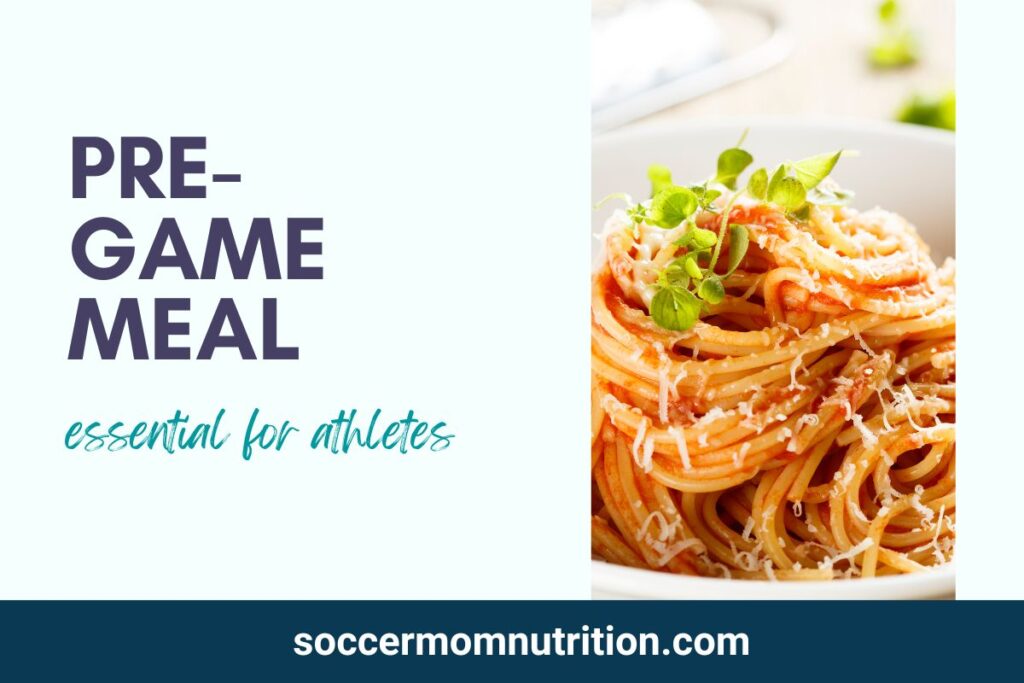
Why are pre game meals important
Pre-game meals are key for athletes since they provide the necessary fuel for optimal performance.
Even for younger athletes who may not engage in 90-minute matches, sustaining energy levels and improving focus is crucial.
Teen and highly competitive athletes, in particular, may require assistance in planning their meals to meet the demands of intense games that last the full duration. (1)
When should you eat a pregame meal
Generally, you should try to have as many “regular” meals as possible before game time. So for competitions in the late afternoon, you should be able to fit in a solid breakfast, healthy snack and hearty lunch.
What should you eat 3-4 hours before your game
If you have a 3-4 hour window before your game, it’s recommended to eat a regular meal.
Focus on high-carbohydrate, moderate-protein and fiber-rich options, with fruits and vegetables on the side. As the game approaches, shift your focus towards healthy pre-game snacks instead of larger meals.
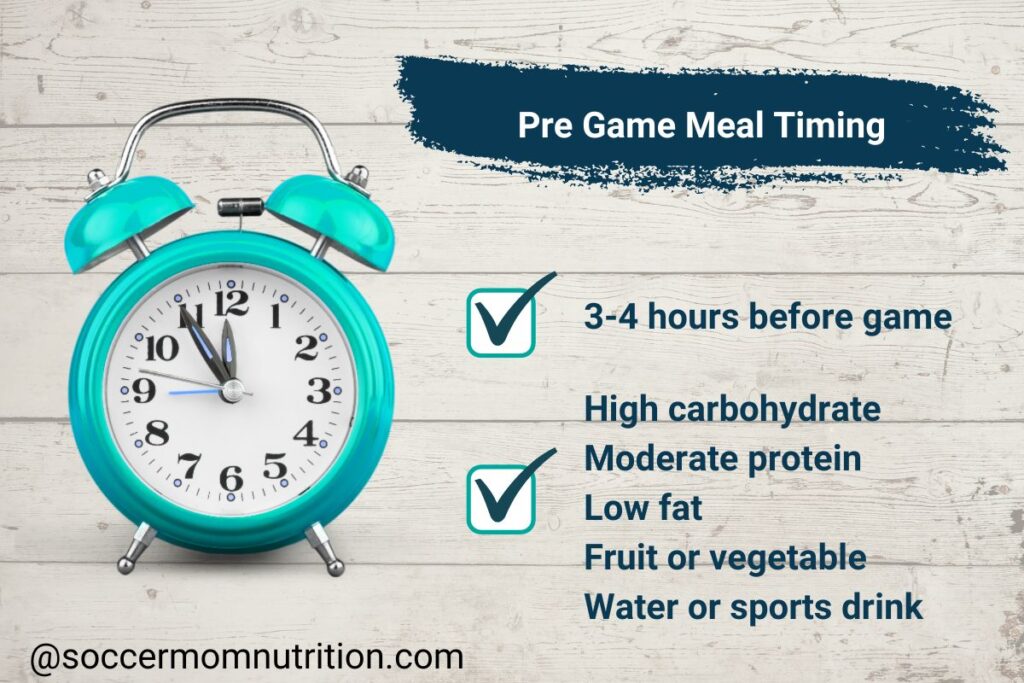
What is the best pre-game meal for an athlete
The best pre-game meal for an athlete consists of high carbohydrate, moderate protein, color and low healthy fat to provide the fuel your body needs to perform its best.
Remember, there is no one-size-fits-all approach to pre-game meals. Every athlete responds differently to foods during competition, so it may require trial and error to find the right foods and timing that work best for you.
The ultimate goal of the pre game meal is to find the right mix of foods that provides the energy needed to play without causing stomach upset or running out of steam.
What to eat before early morning games
Early morning games often leave less time to eat and digest a large meal before kickoff. In such cases, it’s recommended to choose easily digestible carbohydrates that sit well in your stomach.
Here are some ideas for morning pre game meals:
- Cereal and low fat milk or plant based milk and banana
- Low fat greek yogurt and granola and strawberries
- Oatmeal, raisins or fresh fruit and non fat milk
- Whole wheat toast with peanut butter and jelly or honey
- Whole grain waffles or pancakes, nut butter and blueberries
- Mango smoothie with low fat greek yogurt + whole wheat bread or toast
- Whole grain english muffin, fried egg and fresh berries
- Granola, low fat greek yogurt and acai berry or blueberries
What to eat before afternoon and evening games
For games scheduled in the afternoon or evening, you’ll have ample time to eat a good breakfast, hearty lunch and healthy snacks before game time.
Some great options for meals before afternoon or evening games are:
- Turkey and cheese sandwich on whole grain bread, apple slices
- Strawberry smoothie with low fat greek yogurt, half almond butter sandwich
- Chicken noodle soup with whole grain bread and fresh berries
- Brown rice bowl, lean protein or plant based protein and roasted veggies
- Whole grain past with tomato sauce, turkey meatball and steamed veggies
- Whole wheat burrito with grilled chicken, brown rice, veggies and tomato salsa
- Whole wheat wrap, tofu, hummus, veggies and side of fresh fruit
- Omelette with veggies, lean chicken sausage, roasted potatoes
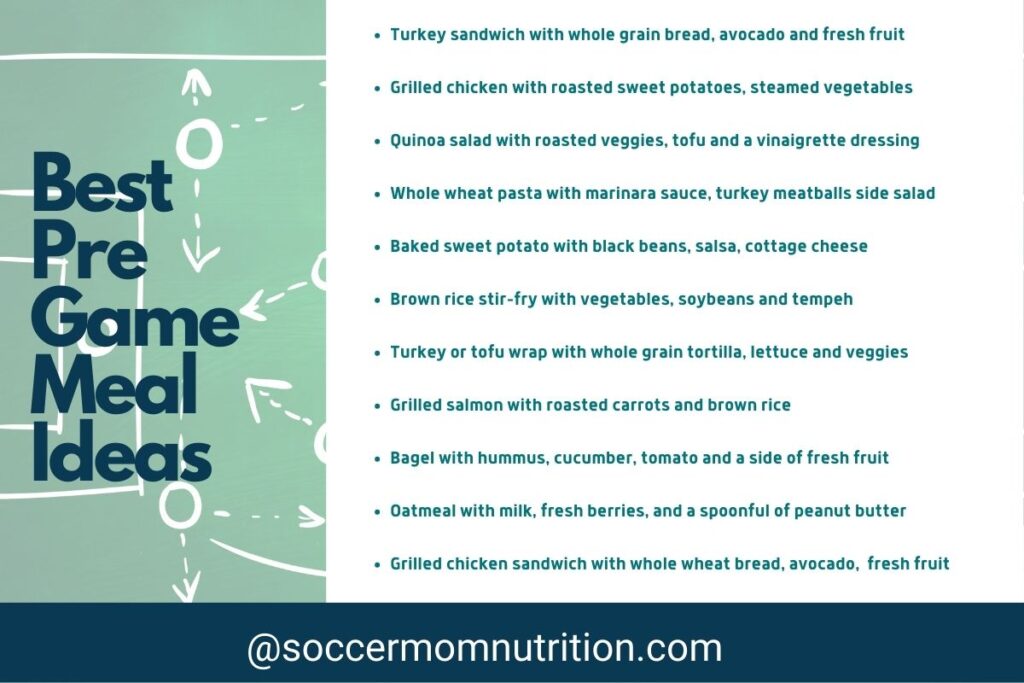
Planning for game day meals
To ensure a smooth game day experience, it’s crucial to plan ahead and identify the foods that work best for you.
So, take stock of a few game day needs:
- What time is the game?
- How many games will I play?
- What time will I wake up and have my first meal or breakfast?
- Will I have 3-4 hours before my game to eat a full meal?
- What are my favorite meals?
- What can I make ahead of time?
- What should I pack for on the go?
- What snacks and pre game foods do I want to have to eat 1 hour before?
By addressing these considerations, you can streamline your game day nutrition strategy.
Healthy tips for eating before a game
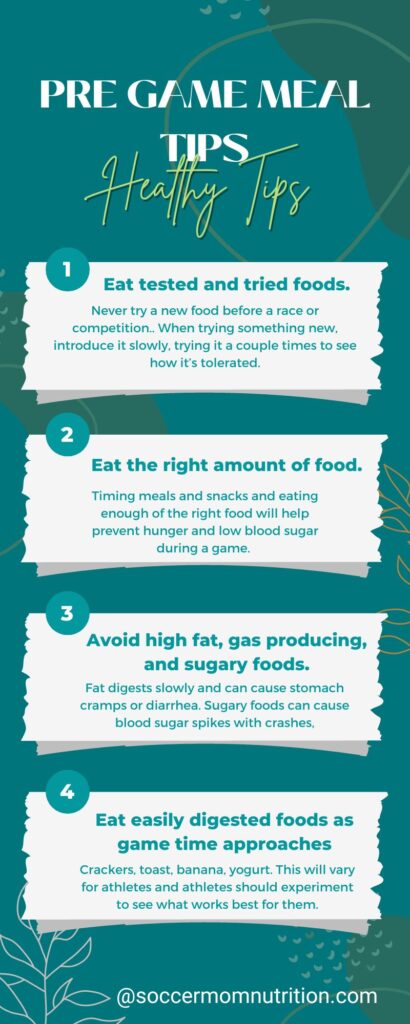
Importance of developing health habits for overall health
While a good pre game meal could improve stamina and endurance for a game, one meal doesn’t take the place of an adequate well balanced eating plan for youth athletes.
Following an athlete diet plan especially in season will ensure you maintain energy, build and repair muscles and support your immune system.
Also, check out our post on game day nutrition. Since you may need to add in some healthy snacks at halftime or sneak in a few gulps of sports drinks or water during injury breaks, you’ll want to have some good options stashed in your gear bag.
Indeed, this will help you stay well hydrated, fueled and ready for the second half.
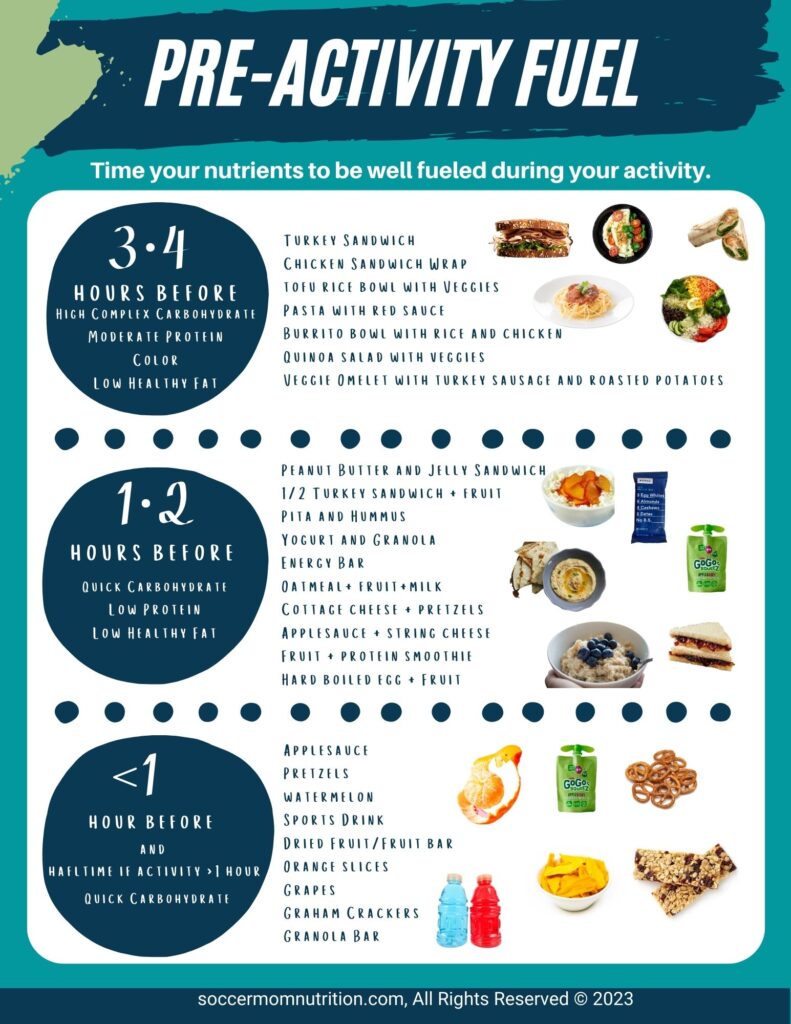
What will you try for your next pre game meal?
Join our mailing list and get our FREE Pre-Activity Fueling Guide.
Stephanie Magill, MS, RD, CD, FAND has over 22 years of experience in public health and nutrition. As a performance registered dietitian nutritionist, Stephanie specializes in sports nutrition and provides simple and actionable information so that athletes can be well fueled for high performance on and off the field. Stephanie has a Master’s Degree in Nutrition and is a Fellow of the Academy of Nutrition and Dietetics.

